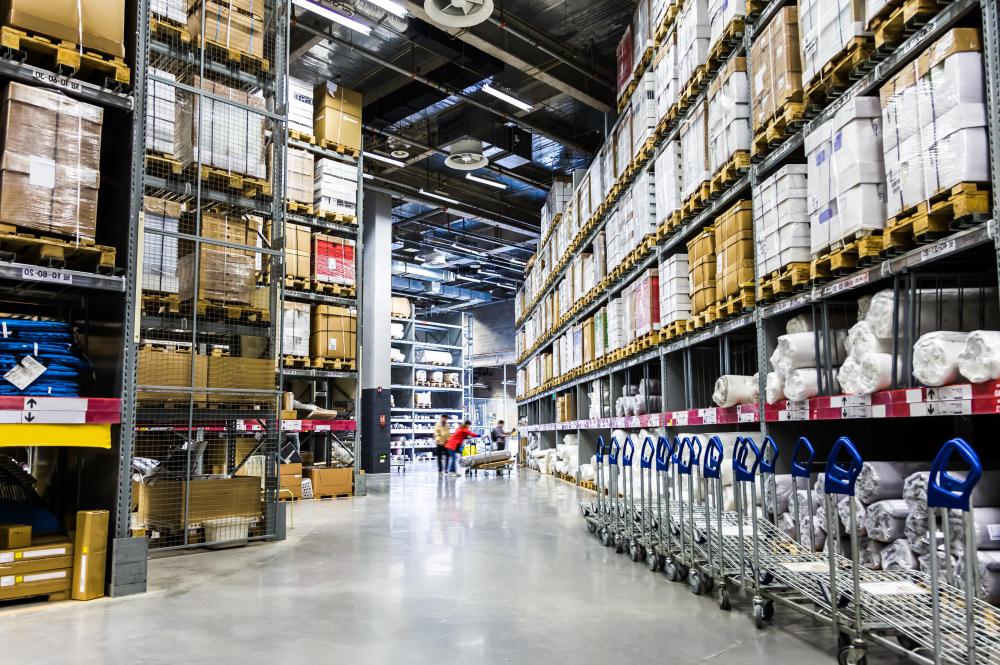At WiseGEEK, we're committed to delivering accurate, trustworthy information. Our expert-authored content is rigorously fact-checked and sourced from credible authorities. Discover how we uphold the highest standards in providing you with reliable knowledge.
Why Should I "Buy Local"?
Consumers are often urged to “buy local,” as well as fair trade and organic. Since it can be more expensive to buy local, some consumers question why it is important. In fact, there are arguments on both sides of the "buying local" debate. People who support buying local argue that it creates a sort of chain effect which can revitalize communities, improve working conditions, and have a positive impact on the environment. Thanks to a growing number of "buy local" movements, many regions of the world promote "buy local" campaigns, making it easy for consumers to identify local independent stores with branding such as stickers and placards.
When it comes to food, some activists believe in the “100 mile diet” — the idea that people should only consume food grown within 100 miles (161 kilometers) of them. By buying local food, you can reduce the impact on the environment by shrinking the number of “food miles” that the food must travel to reach you. You can also support small independent farms rather than corporate businesses. Eating locally can also help you learn more about the natural environment around you. Connecting with your food providers is yet another benefit if you buy local at farmers' markets or through community support agriculture (CSA).

Buying locally produced consumer goods is also valuable. By doing so, you support local businesses which hire locals, pay more taxes, and spend money at other local businesses. Therefore, your money stays in the community, rather than traveling outside of it. When you need goods that are not manufactured in your community, you can still buy them in independently owned local stores, and support the local economy. In the United States, consumers are encouraged to buy goods made in the USA, as they are less likely to use child labor and harmful environmental practices than those made in nations with more permissive labor and environmental laws.

If you buy local along with organic and fair trade, you are also sending a message to companies which produce consumer goods. By indicating that you support your local economy, you are showing a commitment to your community, and an intent to form a stronger economic base for your home region. You are also showing a commitment to locally owned businesses, rather than corporations which hire locals, but take the money they earn elsewhere. In addition, you support a clearly visible supply chain which allows you to see where your goods come from, and how they are produced. Finally, you indicate that you care about working conditions and the environment, and are willing to pay more for cruelty free goods.

Although it may be more expensive in the short term to buy local, it may have positive long-term benefits which should not be overlooked. Buying local may enhance the wealth of your community by working with local businesses, which may in turn make your area more pleasant to live in. With a higher percentage of money staying in the community, cities can afford to engage in civic improvement, better support schools, and sponsor the arts and letters in your community. Buying local can revitalize downtown business districts, which often suffer when a big box store comes into town, and will strengthen your ties with neighbors and business associates.
AS FEATURED ON:
AS FEATURED ON:















Discussion Comments
Okay, this article makes a number of unsubstantiated assumptions that are really based on an idealistic worldview.
Thanks for pointing out the positive. I agree, I hate idealistic worldviews too. I'd rather just ignore ideals. They're inconvenient, and besides, everyone ignores them too.
Also – how does one define “your community”? This seems to be a fairly arbitrary definition if not vague. Okay, I'll try to answer that arbitrary if not vague question with a response that is equally arbitrary if not vague. You can attempt to start whittling it down to something more focused if you wish. If I live in Arkansas and my money is going to California, I don't consider it staying in my community. That's my answer; the ball's in your court.
...corresponding geographical boundaries, for instance, then communities are going to be very diverse and not easily defined. A small rural town say 100 km (60 miles) from the closest city in excess of 100,000 people will qualify as your community. Yet the small rural town and the city with a population greater than 100,000 are very different.
Okay, that's a little better. But while Venus is "very different" from Mars, too, that doesn't mean I should want to blow one of them up with a laser beam. I'm not getting the point. If you live in a big city, keep your dollars local to your big city. If you live in a small town, keep your dollars local to your small town.
This article also assumes that local merchants and businesses are inherently of greater moral and ethical fiber than corporations headquartered in far-off locations that are owned by numerous stockholders. Well, they usually are, so what's the point?
...is also a slum landlord who has a seat on the local school board simply to push forward his own interests of lowering property taxes!
Exercise your right to petition and assemble and vote him out, then.
How is this joker any more ethical or moral than apparently abusive store managers and high level directors and executives who run…Wal-Mart USA for instance?
Hmm, I don't know. A few hundred billion dollars in profits and several hundred thousand employees living under the poverty line, subsidized by your "community," and without access to benefits, vacation pay and no right to unionize, maybe?
This article completely leaves out the poverty factor as well. How can we expect low-income people (particularly families) to spend more on the basic necessities of life? By not supporting the non-local businesses that degrade our communities, perhaps?
This article clearly implies that it is better to pay more for goods purchased locally because in the long-run it’ll pay some kind of dividend (e.g. more money for the local government to spend on local services).
Great, you're getting it...
Yet, if a family spends 10% more on groceries every month by buying locally and their average monthly grocery bill is $500 in a city….30 miles away, they’ll be spending $50 more on average to purchase locally, and $600 more on average over the course of a year. For a family of say…4 people, that’s probably more than the children’s clothing budget, it’s also the annual fees for participation in sports and other extracurricular activities.
You're right, everyone's gotta do it for it to work. Kind of like democracy. So, I propose a solution: Let's start with the rich.
Isn’t this topic really just about what is more convenient for particular people? For some people it’s convenient to buy locally because they have the luxury of spending more for products. For some people it’s more convenient to buy outside of their “community” because it saves them money which they don’t have the luxury of spending haphazardly.
Okay then, let's start with the rich.
-Paul Ronco
Fredericksburg, VA
Okay, this article makes a number of unsubstantiated assumptions that are really based on an idealistic worldview.
Also – how does one define “your community”? This seems to be a fairly arbitrary definition if not vague. If one defines their community as the local level of government and it’s corresponding geographical boundaries, for instance, then communities are going to be very diverse and not easily defined. A small rural town say 100 km (60 miles) from the closest city in excess of 100,000 people will qualify as your community. Yet the small rural town and the city with a population greater than 100,000 are very different.
This article also assumes that local merchants and businesses are inherently of greater moral and ethical fiber than corporations headquartered in far-off locations that are owned by numerous stockholders. The individual who runs the local video store in my “community” (rural town of 2,000 people) is also a slum landlord who has a seat on the local school board simply to push forward his own interests of lowering property taxes! How is this joker any more ethical or moral than apparently abusive store managers and high level directors and executives who run…Wal-Mart USA for instance?
This article completely leaves out the poverty factor as well. How can we expect low-income people (particularly families) to spend more on the basic necessities of life? This article clearly implies that it is better to pay more for goods purchased locally because in the long-run it’ll pay some kind of dividend (e.g. more money for the local government to spend on local services). Yet, if a family spends 10% more on groceries every month by buying locally and their average monthly grocery bill is $500 in a city….30 miles away, they’ll be spending $50 more on average to purchase locally, and $600 more on average over the course of a year. For a family of say…4 people, that’s probably more than the children’s’ clothing budget, it’s also the annual fees for participation in sports and other extracurricular activities.
Isn’t this topic really just about what is more convenient for particular people? For some people it’s convenient to buy locally because they have the luxury of spending more for products. For some people it’s more convenient to buy outside of their “community” because it saves them money which they don’t have the luxury of spending haphazardly.
Post your comments